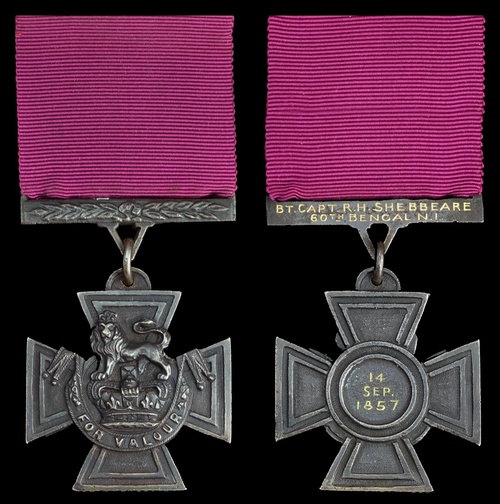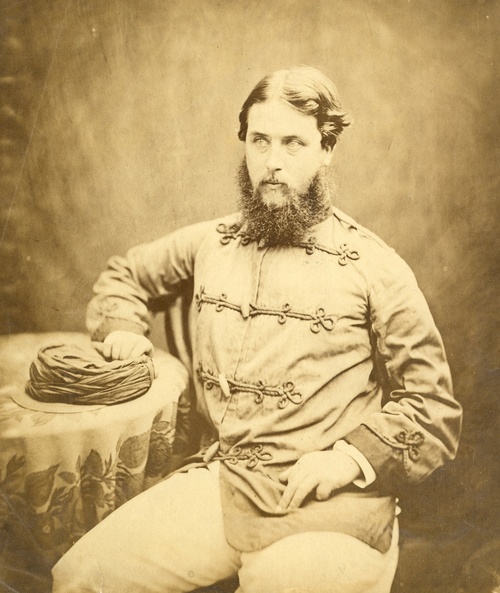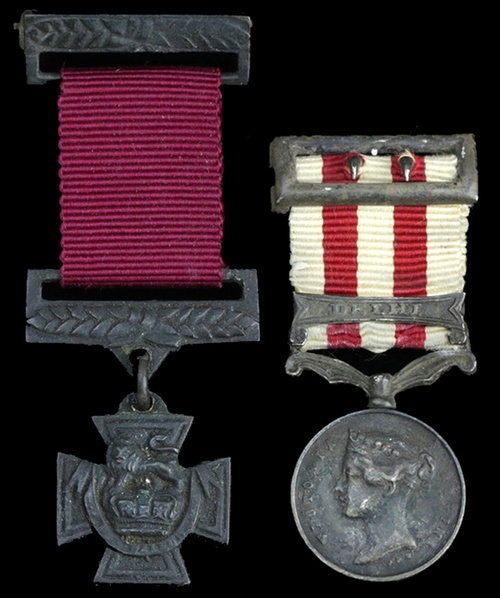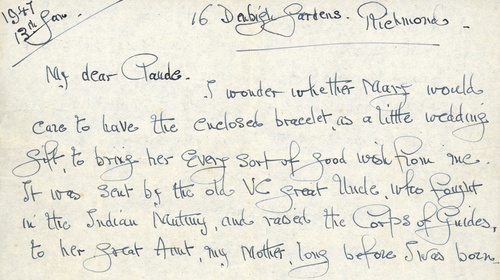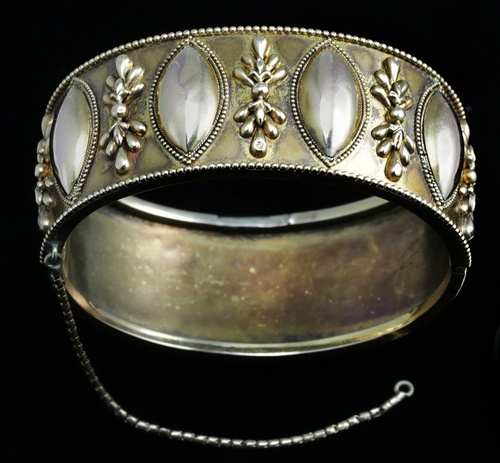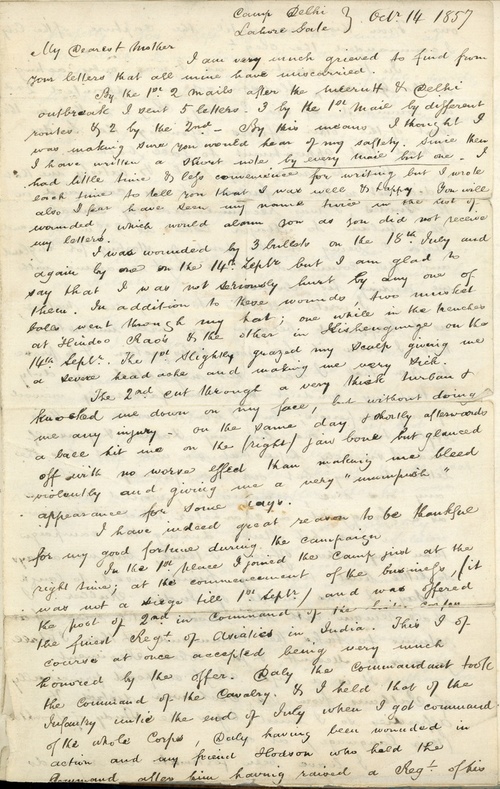Auction: 18001 - Orders, Decorations and Medals
Lot: 551
Sold by Order of a Direct Descendant
'I was wounded by three bullets on 18th July and again by one on 14th September … In addition to these wounds, two musket balls went through my hat.
The first slightly grazed my scalp, giving me a severe headache and making me feel very sick. The second cut through a very thick turban and knocked me down on my face, but without doing me any injury.
On the same day and shortly afterwards a ball hit me on the [right] jawbone but glanced off with no worse effect than making me bleed violently and giving me a very mumpish appearance for some days.
P.S. Tell the girls that I have a great ugly beard and dress myself life a ruffian for want of a razor and good clothes.'
Robert Shebbeare describes a litany of close shaves in a letter to his mother, 14 October 1857; his fellow officers joked that his miraculous survival was attributable to him being 'made of India rubber'.
The important 'Storming of Delhi' Victoria Cross awarded to Brevet Major R. H. Shebbeare, Corps of Guides, late 60th Bengal Native Infantry, who is said to have been wounded on more occasions than any other officer in the Great Mutiny
In that respect his experiences at Delhi on 14 September 1857 were no exception, for having gallantly led the Guides in the fourth column of the assault - under a 'murderous fire' - he departed the field of battle with 'one bullet through his cheek and a bad scalp wound along the back of his head from another'
His letters home - the basis of the publication Indian Mutiny and Beyond - vividly portray a daring, dashing and determined character who seemingly enjoyed a charmed life, striking characteristics that perhaps contributed to his premature death after raising a regiment of Mazhabi Sikhs for active service in the Second China War
On hurrying to meet his ship on its return to England, his family were felled by the sad news that he had died during the voyage home, weakened by fever and having - against all medical advice - displayed grim determination to see battle with his beloved Sikhs
Victoria Cross, the reverse of the suspension bar officially inscribed 'Bt. Capt. R. H. Shebbeare 60th. Bengal N.I.', and the reverse centre of the Cross dated '14 Sep.1857', and the lower arm 'Replacement 1959', extremely fine, upon original pin and in its Hancocks & Co., 9 Vigo Street, London leather case of issue
Together with the recipient's miniature dress awards, comprising the Victoria Cross, with floral top riband buckle; Indian Mutiny 1857-59,1 clasp, Delhi, with claw buckle, both of the period, as worn, toned very fine (3)
V.C. London Gazette 21 October 1859:
'For distinguished gallantry at the head of the Guides with the 4th column of assault at Delhi, on the 14 September 1857, when, after twice charging beneath the wall of the loop-holed Serai, it was found impossible, owing to the murderous fire, to attain the breach.
Captain (then Lieutenant) Shebbeare endeavoured to re-organize the men, but one-third of the Europeans having fallen, his efforts to do so failed. He then conducted the rear-guard of the retreat across the canal most successfully.
He was most miraculously preserved through the affair but yet left the field with one bullet through his cheek, and a bad scalp wound along the back of the head from another.'
Robert Haydon Shebbeare was born at Clapham, London in January 1827 and educated at King's College School. In one of those strange coincidences known to the history of the Victoria Cross, young Shebbeare would be a schoolboy with Philip Salkeld, who would win a posthumous V.C. for his gallantry at Delhi's Kashmir Gate.
Leaving home at the tender age of 17, Shebbeare was appointed a Cadet in the 60th Bengal Native Infantry in 1844 and was promoted Lieutenant in 1849. Clearly a talented linguist, he was made Official Interpreter for the Regiment during 1852 and saw varied service in those years preceding the Mutiny.
Mutiny - opening shots
Shebbeare's first letter of note is dated the 30 May 1857 at Camp Mundlana, 'which you will not find on the map, I fancy'. It describes the opening operations of his regiment:
'Scorching weather! No thermometer in camp but I should suppose 120 in the tent to be about the mark. I wrote to my father before we started and hope he would get the letter and set your minds at ease, as the most wonderfully exaggerated reports will of course reach you as to the fate of the north western provinces.
I had better give you a slight sketch of our proceedings of late. On the 22nd we got (about sunset) our orders to march at midnight. We went down to Kurnaul by the regular marches and halted one day. We were then told that the Treasury at Rohtuck some 60 miles S.W. was in danger and were ordered to march by double marches for its protection, but when we arrived at Paneeputt where the advanced guard of army was, we heard that 600 mutineers from Delhi had gone out and robbed the Treasury and got safe back.
We found Mr. Lock the Collector of Rohtuck at Paneeputt whither he had escaped on horseback after seeing his house set fire to. We marched off next morning with him and made a second march today to a village in his district, the name of which is at the top of my note. We hear all sorts of terrible reports of atrocities committed in Rohtuck by the rebels but I believe nothing that I do not see unless on the authority of European eyewitnesses.
Poor Lock's property however was utterly destroyed without doubt, to the extent of some 10,000 Rupees. Our arrival in the district sets matters to rights wherever we are seen but we shall have to burn some villages and shoot or hang some of the head men of them before all is quiet. The forces are concentrating on Delhi and I fancy you will probably get a good account of it before you receive this scribble, which I only send you to assure you of my own safety. I am keeping a horseman waiting while I write this so I shall not extend it. I am trying to get the authorities here to raise a party of irregular horse and shall try and get command of it if they will do so - but I don't know how things will turn out.
Our Sepoys are behaving very well.
I will write on every possible occasion - assure my father and mother and all at home of my constant love and believe me dear Harry.'
During June, the 60th Bengal Native Infantry - at this time numbering around 900 officers and men - began the march to Delhi. They were engaged at Rohtuck, before they found themselves under fire from the Grenadier Company, who mutinied. With his horse saddled and the other officers in trail, Shebbeare 'had escaped in my shirtsleeves' (ibid). They subsequently completed a 45-mile journey in a day at foot pace and were lucky indeed to escape.
Delhi Ridge
By the time of Shebbeare's arrival on Delhi Ridge, he had taken an informal role in acting as Aide-des-Camps to Brigadier Showers. With no regiment of his own to command, he also soon found himself acting as Second-in-Command of the Corps of Guides, alongside his friend Major W. S. R. Hodson:
'It was too good an offer to refuse. It is a wonderful Regiment composed of 8 companies of infantry and 3 troops of cavalry. The men are from all countries … They are capital men and do their work most pluckily, adding every day to their former fame. The present Commandant, Hodson, is an old friend of mine and we get on very well together. He takes the cavalry and I command the infantry in the field. The men are getting to know me now and we shall get on very well together. I can speak to the Sikhs in their own language and if I remain with them long, I shall pick up Pooshtoo from the Cabool people, I doubt not.
We have had several very sharp engagements and lost a very large number of men … I can't tell when there is a chance of Delhi falling; we have so small a number of men that it appears to be thought imprudent to attack. They attack us on the heights every 2 or 3 days, but are of course always repulsed with great loss.
On the 10th (June) we drove them back to within 250 yards of the Cabool Gate, into which they retired in a great disorder.
As I escaped from camp without any servants or traps I am not very well furnished with clothes, but I manage to get on wonderfully well and I am very happy. Pray imagine for my dress, for I cannot send a sketch of it. A straw hat of this shape, covered with a turban of dust-coloured loose kind of cloth of the same colour, and lower were garments of the same prevailing hue, met by leather shooting gaiters. This with a native sword, a water bottle and a haversack completed my working costume' (ibid).
Shebbeare would no doubt have shared in the engagement near Metcalfe House on 12 June, during which a lively action took place over broken ground, the result being the establishment of picquets for the protection of the left flank. Constantly repulsing attacks upon Hindoo Roa's House, the men were rarely at rest. They would fight and sleep in the same clothing, with the threat of attack at any time.
About this time, Shebbeare and Hodson undertook an unusual mission, the latter writing in his diary of 2 July:
'I have been quite unable to write since the 29th, on the night of which I was ordered off again to Bhagput, to try to bring boats down to camp, either to make a bridge or a 'stop' for the enemy. I expected to be back in good time on the 30th, but the wind and waves were against me, and I could not get my fleet down the river.
Shebbeare was with me, and we worked like a couple of 'navvies', passing the two days and one night on the banks of the river, without shelter and almost without food, for we had nothing but a couple of 'chupatties' each and a small tin of soup and a little tea, which I fortunately took with me. Poor Shebbeare would soon lose the graceful rotund of his figure if he were long on such short commons … All's well that ends well, however, and we succeeded in getting every boat safe into camp last night.'
The operations before Delhi continued apace throughout July, including a notable action fought on the 14th. Hodson takes up the story:
'The fight on that day was the old story. An attack in force on the right of our position; the enemy are allowed to blaze away, expending powder … until 4 p.m. when a column was sent down to turn them out of the gardens and villages they had occupied and drive them back to the city.
I joined it and when we got under fire, I found the Guide Infantry, under Shebbeare, had been sent to join in the attack. I accompanied then and while the Fusiliers and Coke's men were driving the mass of the enemy helter-skelter through the gardens … I went along the Grand Trunk Road leading right into the gates of Delhi. We were exposed to heavy fire of grape from the walls and musketry from behind trees and rocks; but pushing on we drove them right up to the very walls, killing uncounted numbers and then we were ordered to retire.
This was done too quickly by the Artillery and some confusion ensued, the troops hurrying back too quickly. The consequence was the enemy rallied to bring up infantry, and then a large body of cavalry and behind them two guns to bear on us. There were very few of our men but I managed to get eight horsemen to the front.
Shebbeare, though wounded, aided me in rallying some Guide Infantry. I called on the men to fire, assuring them that the body of cavalry coming down would never stand; my gallant Guides stood their ground like men; Shebbeare, Greville, Jacob and little Butler came to the front and the mass of the enemy's cavalry, just as I said, stopped, reeled, turned and fled in confusion.'
Shebbeare was wounded thrice in the action, placed upon the sick list and duly mentioned in Major Reid's despatch for the Main Picquet, Hindoo Rao's House (London Gazette 12 August 1857, refers). He thought it prudent to warn his mother:
'This mail leaves for England tomorrow and I must write a few lines as you will probably see my name amongst the wounded. I am thankful to be able to tell you that although I was struck by three bullets my wounds are very slight. One ball hit me on the right side, another almost simultaneously on the muscle of the right arm and a third about 5 minutes after on the right arm above the wrist. We are still before Delhi … they have attacked the right of our position near Hindoo Rao's house 22 times! I have been present at nearly every engagement' (ibid).
Victoria Cross
It was however the events of 14 September - the Storming of Delhi - that led to Shebbeare's award of the V.C. He wrote to his mother on the 30th:
'I am again obliged to send you a shabby chit as I have been out of the district on an expedition, but as you will see again my name amongst the list of wounded I cannot leave you without the assurance that my wound was very slight and that it did not prevent my bringing the Regiment out of action - we have very severe fighting.
Poor young Murray, as a fine a young soldier as I ever met, fell close by my side. A great number were killed and wounded and our loss especially was very heavy but thank God the day was won and we are now living inside the city' (ibid).
He wrote in greater details to his father on 13 January 1858:
'On the 14th we were with Reid's Column, the 4th, on the Kichengunge attack. Major Reid was shot in the head at the very commencement and the consequence was, that the Fusiliers, who led the attack, were not properly supported, as we in the rear had received no orders. However we, shortly afterwards, went up to the front and finding it impossible at the moment to advance in face of the terrible fire, from the front and flanking fire from both sides, we tried a garden wall which gave us some shelter. This position we held for some time.
I tried to get the men to make another attack and jumped over the wall followed by Murray, McLean and Koodrutoola Subadar, with a Sergeant called Dunleary of the 1st Fusiliers, 2 riflemen and 3 or 4 Guides, but we were not supported and could do no good by advancing. I went back to call more men, while Murray with the others knelt behind a small bank.
At this moment poor Murray was struck by a bullet in the middle of his chest and died in the spot. McLean said to him 'Are you hit?' and he put his hand on his chest but could not speak. His death was perfectly sudden. I did not know it at the time for seeing that the enemy annoyed our men very much by firing from a small temple to the right of our position. I went with some men to run them out.
Shortly after we found the enemy coming round out flank to cut off our retreat and we withdrew towards our old position as we could never have made good our attack on the guns in the face of the overwhelming force which had assembled against us.
Captain Daly, however, saw Koodrutoola with some men and then managed to bring it in [Murray's body] the next morning. I buried him at once and afterwards Captain Daly, Sir Edward Campbell and I went and read the burial service over his grave' (ibid).
Shebbeare summed up the events at Delhi in another letter on 14 October, written exactly one month after the Victoria Cross action; the original letter is included in the archive:
'I have indeed great reason to be thankful for my good fortune during the campaign. In the first place I joined the camp just at the right time; at the commencement of the business and was offered the post of Second-in-Command of the Guide Corps, the finest Regiment of Asiatics in India. Daly the Commandant took command of the Cavalry and I held that of the Infantry until the end of July when I got command of the whole Corps, Daly having been wounded in action and my friend Hodson, who held the command after him, having raised a Regiment of his own. From this time until the capture of the city I commanded the Regiment. In the meantime, as I was only acting in the Guides, Hodson got me appointed 2nd in Command of his Cavalry Regiment.
I write all this to you, dear mother, as it happened because you will understand that I write it for your satisfaction and to prove to you that I have not neglected my duty and that my conduct has been favourably viewed by my superiors; but I write in this style to no one but my Father and yourself and I sincerely hope that you will not show the letter to anyone but our own family circle. Anyone else reading it would put me down as a braggart, a character which I despise.
I was hit oftener during the campaign than any other Officer I think, but was always so little that my friends used to laugh and say that I was made of India Rubber!
I have written a most horribly egotistical letter; but what can a soldier's letter be after a fight if not egotistical? (ibid).
Command - 15th Punjab Pioneers
Recovered from his wounds, Shebbeare remained in India and was charged to command a new regiment of Mazhabi Sikhs. Despatched to Lahore in early 1858, he soon found the 15th Punjab Pioneers 'only existed on paper.'
Having therefore begun his command by passing the time with 'a game of cricket now and again', he eventually raised the new regiment to a strength of 900 men. Meanwhile, he appears to have received certain news of the award of his V.C. He wrote to his mother in September 1859, stating:
'Colonel Norman wrote to me the other day that Lord Clyde has recommended me for the Victoria Cross so I shall get it before long. I told you that I thought I should get it but you did not seem to think it likely and Harry said he would believe it when he saw it in the Gazette. I should not have said anything about it if I had not thought and been told that it was pretty certain. You will now see that I was not far wrong … ' (ibid).
China - journey's end
With the onset of the conflict in China, the opportunities for Indian Regiments looked slim. However, Shebbeare's newly raised 15th Punjab Pioneers bucked the trend and quickly found themselves en route to Manchuria via Hong Kong. It was here, in July 1860, that Felice Beato would take his portrait photograph; see accompanying archive.
Within days of coming ashore, Shebbeare was struck down by illness and therefore unable to accompany his Sikhs at the capture of the Taku forts. Writing home on 10 August 1860, he stated:
'I am just recovering from a severe attack of Fever and Liver which commenced on the 26th, the day we left Talien Bay. I am in hopes that the liver is reduced to its natural size again now and I feel no pain in it so that I may be said to be quite well, but I have not got a bit of strength in my body, my legs are ridiculous to look at and I can hardly lift a cup of tea. Now however the mutton chop commences, and I hope a glass of beer, and I trust I shall pick up rapidly.
Meantime my Regiment is onshore under Randall and although it could not be in better hands, I can't help regretting that I cannot command it myself. The Regiment is gone out today to take some entrenched camps [Taku Forts]. I hope most sincerely to join in about 5 days more' (ibid).
It was not to be. Lieutenant Baker, who had served in the 60th Bengal Native Infantry and who was serving as a volunteer in China, describes Shebbeare's final days:
'The Regiment landed leaving him aboard the Bentinck … unfortunately your son suffered greatly mentally. His gallant spirit chafed at being left behind. He had determined to lead the men he had raised and to be lying down weak and ill when all were up and doing affected him most seriously. His whole mind centred on the Regiment and when the heavy guns were heard on board his excitement was intense.
Finally, on learning the date on which the assault was to take place, he determined to land and take command. The Doctor by unremitting care having succeeded in bringing the poor man round but all was useless after the first gun was fired.
The ships boat with an awning conveyed him 10 miles to Pehtang. There he mounted his horse and rode 10 more to join the camp. The day was intensely hot and alas! his noble spirit, after bearing him through all fatigue, broke down during the long delay and he became much worse. Friends were with him throughout. All in the Army were glad to render assistance but without avail and at last he was ordered home …
The painful end you will know and his body is beneath the deep blue sea.'
Shebbeare died aboard the S.S. Emau on 16 September 1860, having been ordered back to England by the Medical Board. He was 33 years old. When the vessel arrived in England, his family hastened to meet him, only to discover the sad news of his passing. He never wore his full-size Victoria Cross, which was forwarded to his heartbroken family.
His old Delhi friend, Captain Daly, wrote to his father in November 1860:
'The sad announcement of the fate of your soldier son compels me to write a few words to you. My sorrow can be as nothing to your sorrow, yet perhaps you will not cast aside the deep sympathy I tender.
Intimacy prior to the days at Delhi there was none between us. At Delhi we were comrades in many trials and dangers and I learnt truly to appreciate the devotion and gallantry, the truthfulness and stoutness of your son.
I was so impressed with his merit and services that I interposed to obtain for him the command of the Guides during the last few days of my incapacity from wounds; at a time when more than I can express depended on the character and bearing of the leader of the Corps.
I mourn for the loss of so good a soldier - few men of his standing possessed so much power over those under him, that is, he could and did command men. He was a rare soldier and as such he has left a name and performed services which will long be a cheering example to many in his profession.
I will not affect to write of the grief of his family, but the knowledge of the estimation in which your son was held by those who had seen him most tried may in some way soothe the parents in their affliction.'
Postscript
Shebbeare's V.C. and Indian Mutiny Medal, clasp Delhi, were loaned by the family for display at the Centenary Exhibition of the Victoria Cross in 1954. Upon the conclusion of the exhibition in 1958, the awards were found to have been misplaced. They were never recovered in spite of a formal investigation at the time.
Following a high-profile campaign, which included a formal debate in the House of Commons and much press coverage, the issuance of an official replacement was sanctioned in 1959.
To be sold with an Indian gilt-metal bracelet, unmarked, typical of local nineteenth century manufacture, together with a hand-written letter from Beatrice Gates:
'16 Denbigh Gardens
Richmond.
13 January 1947
My Dear Claude
I wonder whether Mary would care to have the enclosed bracelet as a little wedding gift, to bring her every sort of good wish from me. It was sent by the old V.C. great uncle, who fought in the Indian Mutiny, and raised the Corps of Guides, to her great aunt, my mother, long before I was born. As it has a history attached to it, I am sending it to you, with an explanation, but I am going to register it so please don't any of you write about it. How busy you must all be with the wedding so near. I look forward greatly to attending it.
Love to you all and Kathleen, from your affectionate cousin.
Beatrice Gates'
To also be sold with an important archive of original documentation, comprising:
(i)
A unique archive of seven original letters, written in ink, by R. H. Shebbeare V.C., from 1857 to 1860, written from Camp Delhi, Lahore Dawk Bungalow, Anarkullee, Goozaira, and the Ship Bentinck, offering an important insight into operations around Delhi, his suffering from severe fever, and his subsequent passage towards Hong Kong; these are supported by a further seven contemporary letters written to his father and family at large, addressing and mourning his loss; together with a number of original envelopes.
(ii)
A handwritten notebook: 'A Record of the family of Shebbeare, compiled principally by Henry Francis Shebbeare, Barrister at Law'. This detailed text commences with the evolution of the surname Shebbeare, first noted as Seftbere in 1216, and includes a large amount of information relating to Robert Haydon Shebbeare, V.C., including a hand written record of service, an account of the V.C. action by H. F. Shebbeare, and an original three-page letter pasted within, written by R.H. Shebbeare to his mother from Camp Delhi, 14 October 1857, detailing his wounds and as cited above, 39 pp., inclusive of newspaper cuttings, small pencil and pen & ink sketches, and photographs of the family home, covers loose due to absence of spine, pages otherwise lightly held together
(iii)
Typed copies of approximately 60 letters written by Robert H. Shebbeare to his mother and other family members from Ananbsulsee, Camp Ackbur, Goozaira, Lucknow, and Camp Talien Hwan in Manchuria, from 1857 to 1860; these offer an outstanding and very personal insight into his many adventures.
(iv)
Two copied photographs of R. H. Shebbeare, V.C., one stamped Craine, Roche & Co., 30 Chiltern St., W.1., to reverse.
(v)
The original receipt from Lieutenant-Colonel G. A. Sheppard, Honorary Secretary Indian Army Room Committee, Royal Military Academy, Sandhurst, dated 19 January 1949, acknowledging the safe arrival of the Victoria Cross and Mutiny Medal of Brevet Major R. H. Shebbeare, V.C.; addressed to Lieut. Colonel R. A. Shebbeare, Eastwell Manor, Potterne, Devizes, Wiltshire.
(vi)
A comprehensive archive of over 30 letters detailing the loss of the Victoria Cross and Indian Mutiny Medal; these offer a thorough insight into the circumstances regarding the loss from the Indian Army Exhibition of the Royal Military Academy, Sandhurst. The letters detail the circumstances of the V.C. entering the exhibition in 1949 and the request by the family for the return of the medals in preparation for a Centenary party; they could not be found in September 1957 following a change in curators; the correspondence details efforts to find the medals, a Board of Enquiry under Major-General R. W. Urquhart, C.B., D.S.O., the input of George Wigg, M.P. on behalf of the Shebbeare family, and discusses the financial recompense to the family for their loss.
(vii)
A letter and draft 'Deed from The Treasury Solicitor', dated 28 August 1959, which offers a step-by-step account of the events leading to the loss of the medals, the £550 compensation to be paid, transfer of ownership to the Secretary of State, and circumstances resulting in the transfer of the medals back to the family should they be found; a second letter and Draft Deed from the Treasury Solicitor, dated 20 October 1959, which offers more details and addresses in 3. (1), the handing over to Robert Claude Reginald Shebbeare a replica of the lost V.C., the words 'Replacement 1959' being added on the Cross after the name of the late Captain Robert Haydon Shebbeare; annotated in red ink with numerous additions and crossings out; and third and final letter, inclusive of a Duplicate of the Deed, dated 3 December 1959, signed by three members of the Shebbeare family and Charles Edward Key, in O.H.M.S. envelope of transmission.
(viii)
A copy of Parliamentary Debates (Hansard), House of Commons Official Report, Volume 601, No. 74, 10 March 1959; it quotes Mr. Wigg's address to the House of Commons, pages 1145 to 1148:
"I want to raise two very serious and important matters. On the 14th September, 1857, Captain Robert Shebbeare won the Victoria Cross. This gallant officer volunteered for service in China and was engaged in the attack on Taku Forts. Unfortunately, he was stricken with illness and, after being embarked for the United Kingdom, he died at sea off Shanghai on 16th September, 1860. His Victoria Cross, one of the earliest of these medals to be awarded, was, needless to say, cherished by his family. To say that it was an heirloom is to put it mildly … "
Reference sources:
Creagh, Sir O'Moore, and Humphris, E.M., The Victoria Cross 1856-1920 (London, 1920).
Hibbert, Christopher, The Great Mutiny (Penguin Books, London, 1978).
David, Saul, The Indian Mutiny: 1857 (Penguin Books, London, 2003).
Littlewood, Arthur, Indian Mutiny and Beyond: The Letters of Robert Shebbeare, V.C. (Pen & Sword, 2007).
Griffiths, Charles John, A Narrative of the Siege of Delhi (London, 1910).
Dalrymple, William, The Last Mughal: The Fall of Delhi, 1857 (Bloomsbury, 2007).
Subject to 20% VAT on Buyer’s Premium. For more information please view Terms and Conditions for Buyers.
Sold for
£30,000

